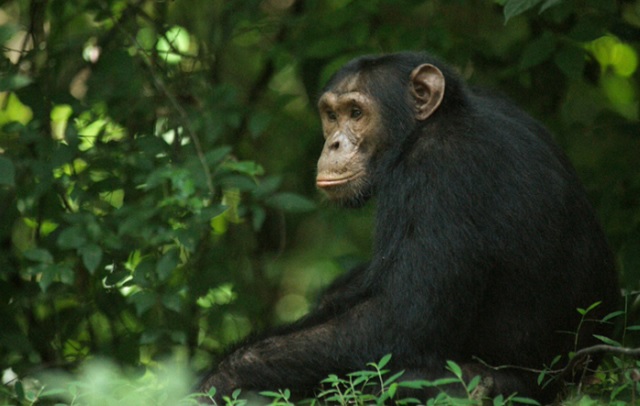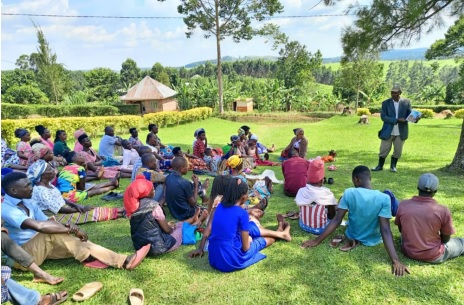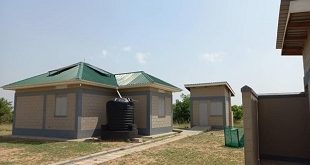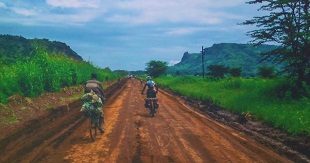
Arcus Foundation donates money for small businesses and removal of snares
Kampala, Uganda | RONALD MUSOKE | Frontline communities living adjacent to Kibale National Park in western Uganda have received about US$450,000 (Shs1.7 billion) thanks to a project that is intended to train about 2000 entrepreneurs around the park. Uganda Wildlife Authority says the park is famous for chimpanzees, elephants and antelopes as well as hundreds of bird species.
The fund from Arcus Foundation was announced on Earth Day (April 22) and will go into the expansion of the Poverty Alleviation and Removal of Kibale Snares (PARKS) project which has been running over the last three years. It will reach out to more communities around Kibale National Park to reduce extreme poverty and safeguard the endangered chimpanzee population.
The PARKS project which is implemented in partnership with Village Enterprise and Ngogo Chimpanzee Project was launched in 2021 with funding from the Arcus Foundation to reduce extreme poverty among rural communities near Kibale National Park and to protect one of the largest remaining populations of endangered East African chimpanzees and their habitat.
Without opportunities to earn sustainable incomes, households living in extreme poverty near the park have often relied on illegal hunting and logging in order to provide for their families. To draw such people away from these destructive ventures, Village Enterprise works to equip these communities with training, start-up funding, and ongoing business mentoring to launch businesses that do not harm vital ecosystems in and around Kibale National Park.
Its aim is to help households earn greater incomes, break the cycle of extreme poverty, and become stewards of their environment. According to a brief on the PARKS project, Village Enterprise has trained over 3,800 entrepreneurs of whom six of every ten beneficiaries are women.
The project has equipped them with skills on how to start micro-enterprises, develop savings habits, and on the value of conservation. The training has reportedly resulted in the creation of over 1000 conservation-friendly micro-enterprises by local entrepreneurs, including retail and grocery shops, agribusinesses, animal husbandry, and even beekeeping.
Thanks to the micro-enterprises, over 20,000 people have been supported onto a sustainable pathway out of extreme poverty, as well as reduced hunting and habitat destruction in Kibale National Park.
Dianne Calvi, the CEO and President of Village Enterprise, the implementing partner of the PARKS project, commended the Arcus Foundation noting that the new grant will be able to transform the lives of even more people living in extreme poverty near Kibale National Park, while also protecting the park’s vital ecosystems and one of the largest remaining populations of East African chimpanzees.
“In order for conservation efforts to truly succeed, we can’t take away an individual’s ability to earn an income, especially when they are living in extreme poverty. We need more projects like PARKS that foster both conservation and the entrepreneurial spirit,” she said.

“By providing individuals with the training to become entrepreneurs, we are offering them a sustainable alternative to generate income, increase their savings, and eliminate their reliance on illegal hunting or deforestation. Ultimately, this is how we can safeguard nature, protect endangered species, and end extreme poverty.”
Households’ sustainable incomes
The new grant will enable Village Enterprise to train a further 1,890 entrepreneurs who are currently living in extreme poverty through a one-year programme which will provide them with seed capital, mentoring, and business and financial literacy training they need to establish micro-enterprises that are conservation-friendly.
As part of the programme, Village Enterprise has already helped establish 109 savings groups, which are small communities of fellow entrepreneurs who help encourage each other to put away savings on a weekly basis.
The new funding will allow for 42 new business savings groups to be created. These savings groups also allow entrepreneurs to have access to greater capital through loans that they can use to expand their enterprises or in case of emergency.
The project empowers the new entrepreneurs to generate an increased and more consistent income for their households, establish a sustainable pathway out of extreme poverty, and become less – and eventually no-longer – reliant on the need for income generated via illegal hunting or lumbering inside of Kibale National Park.
In 2023, Village Enterprise also introduced a new component to strengthen the climate and conservation pillar of the project; conservation champions. Within each savings group, a conservation champion is selected, trained on conservation practices, and then equipped to share their expertise with the group and other community members. Together with their village, the conservation champion creates a tailored conservation plan for their community that supports the protection of wildlife and vital ecosystems.
The conservation champions then work with fellow savings group members to ensure all newly-launched businesses are environment friendly. They also conduct follow-up meetings to ensure actionable steps have been taken–at both the household and community level-towards achieving the village’s conservation plan. At the moment, there are 52 conservation champions who have been trained.
On top of launching businesses to reduce the need for illegal hunting, and introducing conservation messaging to reduce habitat destruction, PARKS is taking another proactive measure to protect the chimpanzees. Through Ngogo Chimpanzee Project’s work on the project, 824 hunting snares have been removed from the park.
Snare removal and anti-poaching patrols
With active monitoring of park borders, anti-poaching patrols, and the removal of snares, PARKS aims to continue seeing diminished hunting in and around the park and an increase in the overall chimpanzee population.
The new grant will enable the Ngogo Chimpanzee Project to operate eight two-person anti-poaching patrol teams in the Kibale National Park area. These patrols will remove snares and deter individuals from hunting and destroying habitat by illegal logging activities. In addition, the grant will provide the margins of the park with two patrol teams which will reduce crop raiding and improve community relations with the park.
While celebrating the World Wildlife Day last year, Sam Mwanda, the Executive Director of the Uganda Wildlife Authority (UWA), the country’s top conservation agency, reiterated the importance of the people who live in the midst of the country’s rare wildlife species. These people who live near the country’s protected areas, the so-called frontline communities, are often described as Uganda Wildlife Authority’s biggest partners.
Mwanda said it is important for UWA and its partners to work with people in communities adjacent to parks in order to fight poaching and wildlife trafficking because these two factors are responsible for reducing wildlife populations and when these reduce, tourist numbers go down and the benefits that accrue from tourism also go down. “If we fail to work with neighbouring communities, we would have failed to manage wildlife,” he said.
 The Independent Uganda: You get the Truth we Pay the Price
The Independent Uganda: You get the Truth we Pay the Price


